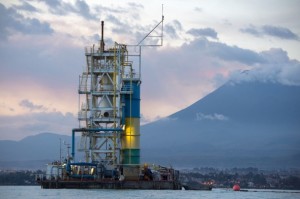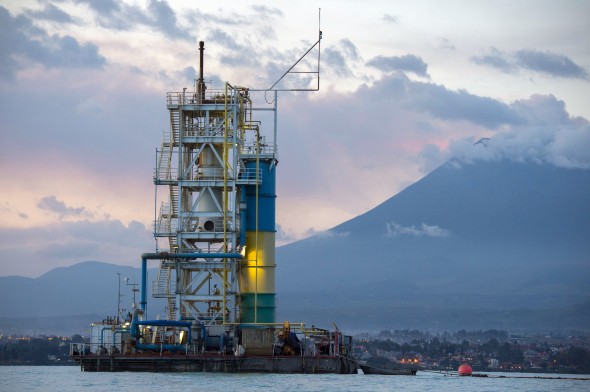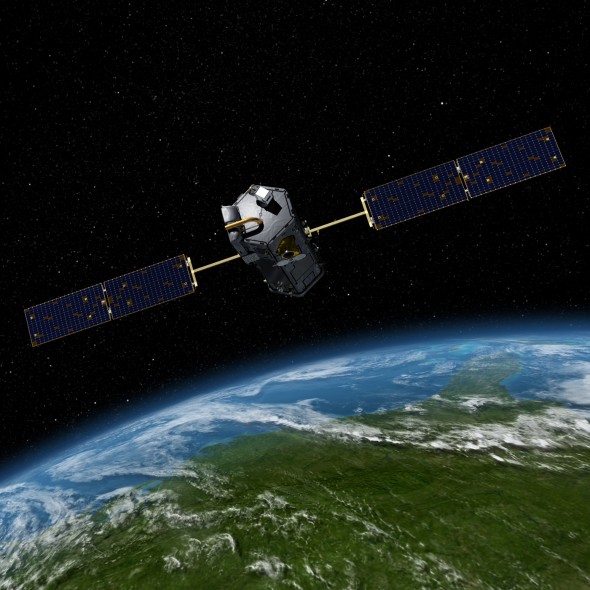
Rwanda Inaugurates Groundbreaking Methane Power Project
Rwanda Inaugurates Groundbreaking Methane Power Project
First-of-its-kind project to extract gas—and avert catastrophe—comes online on Central Africa’s Lake Kivu.
Lake Kivu, which straddles the border of Rwanda and the Democratic Republic of Congo, is renowned for its most unusual resource. Dissolved in its deep waters, at a scale not seen anywhere else on Earth, are billions of cubic meters of methane and carbon dioxide, which result from nearby volcanic activity. For decades, scientists, engineers, and the governments of the two states have sought to extract the methane—the principal component of natural gas—and use it to generate power in one of the world’s must under-electrified regions (see “Lake Kivu’s Great Gas Gamble”).
Now, with the launch of Kivu’s first large-scale gas-to-power plant, the endeavor has reached a major milestone. On Monday, from the Rwandan lakeside town of Kibuye, the U.S. energy company Contour Global inaugurated the first phase of KivuWatt, a $200 million facility that is the only industrial-scale plant of its kind in the world. It draws up water from an offshore barge, siphons off the methane, and pipes it to a 26-megawatt power plant on shore.
KivuWatt’s phase one, which faced years of delays before beginning to feed the grid on January 1, will be joined in the coming years by a series of similar ventures. In a second phase, Contour Global plans to build two or three more barges, ramping up capacity to 100 megawatts. Another U.S. firm, Symbion Power, signed an agreement with the Rwandan government to build a 50-megawatt project last December.
 A platform that extracts natural gas from Lake Kivu, with the Democratic Republic of Congo’s Nyiragongo volcano in the background.
A platform that extracts natural gas from Lake Kivu, with the Democratic Republic of Congo’s Nyiragongo volcano in the background.
The lake’s long-term power generation potential remains uncertain. A team of experts assembled in 2009 estimated that Kivu’s methane could yield anywhere from 160 to 960 megawatts over a period of 50 years, depending on the efficiency of the extraction process and the power conversion technology. Even the low end of that range is more capacity than Rwanda has now. Contour Global officials say that early measurements are encouraging. According to CEO Joseph C. Brandt, the quantity and purity of gas extracted have exceeded official estimates. This is likely to allow the addition of a further eight megawatts from the existing barge, possibly by early 2017.
Aside from providing critically needed power, KivuWatt and other projects like it were also conceived to mitigate potential catastrophe. Measurements taken in the mid-2000s showed the lake’s methane rising at a rate that could cause Kivu’s overall gas concentration to approach saturation by the end of the century. At that point an earthquake or volcanic eruption could cause the gas to be released, suffocating entire towns along the lake and threatening more than two million people.
Experts monitoring the lake say the risk of this happening anytime soon is negligible. Still, most agree that removing the methane over time would significantly reduce the long-term threat. “As we got to know the scientists who really understand the lake, we realized it’s a very unusual win-win: where the science, society, state, and private interests are all aligned,” Brandt said of KivuWatt. “You rarely find this in the commercialization of a commodity.”
Jonathan W. Rosen is a journalist based in Kigali, Rwanda. He is a 2016 Alicia Patterson Foundation reporting fellow.

Leave a Reply